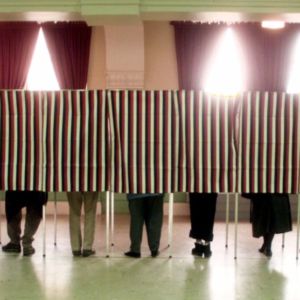Along with turning up the heat in the national debate over gun laws, the horrific attack at Marjory Stoneman Douglas High School in Florida last month has introduced the nation to a new generation of articulate, passionate teenagers.
Days after watching classmates get gunned down in their school, the Parkland massacre’s young survivors confronted the president at the White House and successfully pushed Florida lawmakers to change gun laws in ways that were unthinkable until the kids took up the cause. Their activism inspired hundreds of thousands of people to participate in this weekend’s “March for Our Lives” in Washington and sibling marches across the country.
The students have sent us a welcome and encouraging sign about the health of our democracy, particularly in an era in which so many Americans seem to have given in to a feeling that our politics are beyond repair.
We need to listen to these folks and keep them engaged.
One small but important way to start would be to get them registered to vote — even before they’re eligible to cast ballots. Common Cause, the organization I’m privileged to lead, is supporting pre-registration in states across the country.
Fifteen states — California, Colorado, Delaware, Florida, Hawaii, Louisiana, Maine, Maryland, Massachusetts, Nevada, New Jersey, North Carolina, Oregon, Rhode Island and Utah, plus the District of Columbia — already are on board; they permit 16- and/or 17-year-olds to register so that they can vote as soon as they turn 18. Twenty-four states and D.C. let 17-year-olds vote in primary elections if they will turn 18 by Election Day.
A handful of local governments across the country have taken the next logical step, lowering the voting age for their elections. Takoma Park, Md., a Washington suburb, was the first; it lowered the voting age to 16 in 2013. An organization called Vote16USA is running lower-the-age campaigns in 10 other cities or states.
The available evidence indicates that turnout among young voters increases when pre-registration is permitted. A study of Florida’s registration and turnout in 2008, for example, found that teens who signed up to vote before turning 18 went to the polls at a rate 2 percentage points higher than those who didn’t register until after their 18th birthday. The bump in turnout was even larger among African-Americans and Hispanics who pre-registered, the researchers found.
The already strong case for pre-registration got a boost recently from an unlikely source: Denmark. A study of Danish voters by Jens Olav Dahlgaard, an assistant professor in political science at the Copenhagen Business School, suggests that as it boosts turnout among young voters, pre-registration also produces a “trickle-up” effect, as parents react to their children’s enfranchisement by stepping up their own participation.
In a recent essay for The Washington Post, Dahlgaard summarized research across four Danish elections, finding that adults whose voting-age children were still living at home went to the polls at a rate 4 percentage points higher than those whose children had moved out.
“Many children start leaving home around age 18 — meaning that many young people will leave home before the first election in which they can vote,” Dahlgaard wrote. “If the voting age was 16 or 17, more children would still live with their parents in their first election — and both groups would be a bit more likely to vote.”
For me, the bottom line is this: simply by virtue of their age, young people in every election have more at stake than any other demographic group; they have longer to live with the decisions we all make. That alone is more than enough reason for those of us who already can vote to do all we can to bring them into the body politic and encourage them to stay involved.

